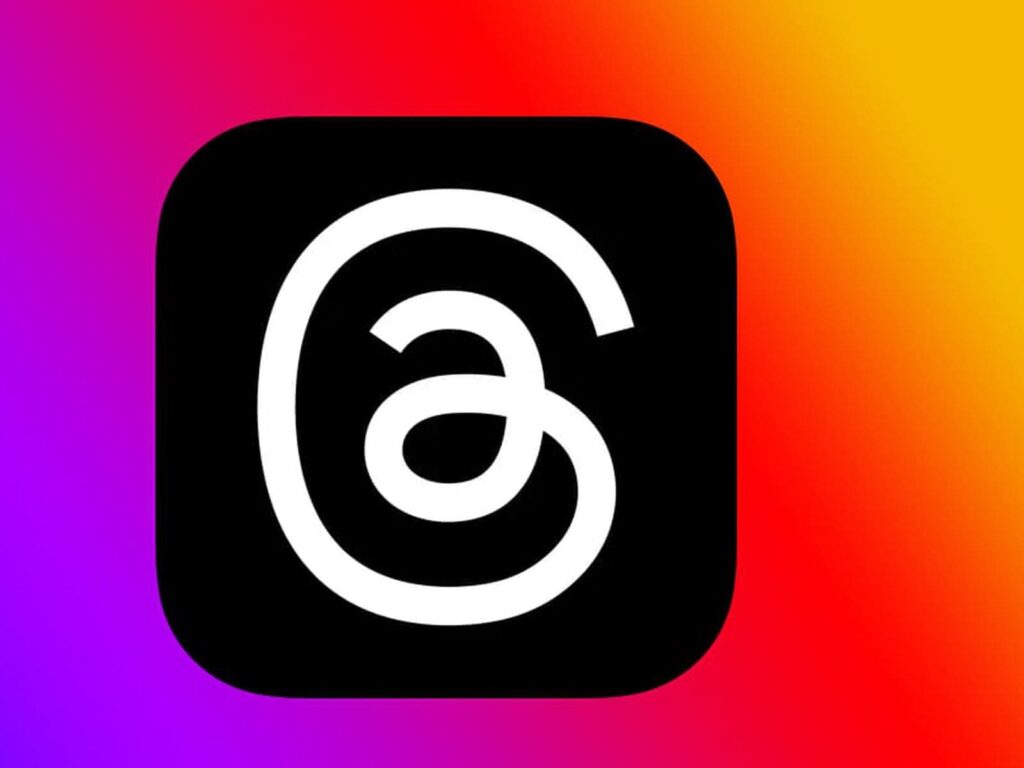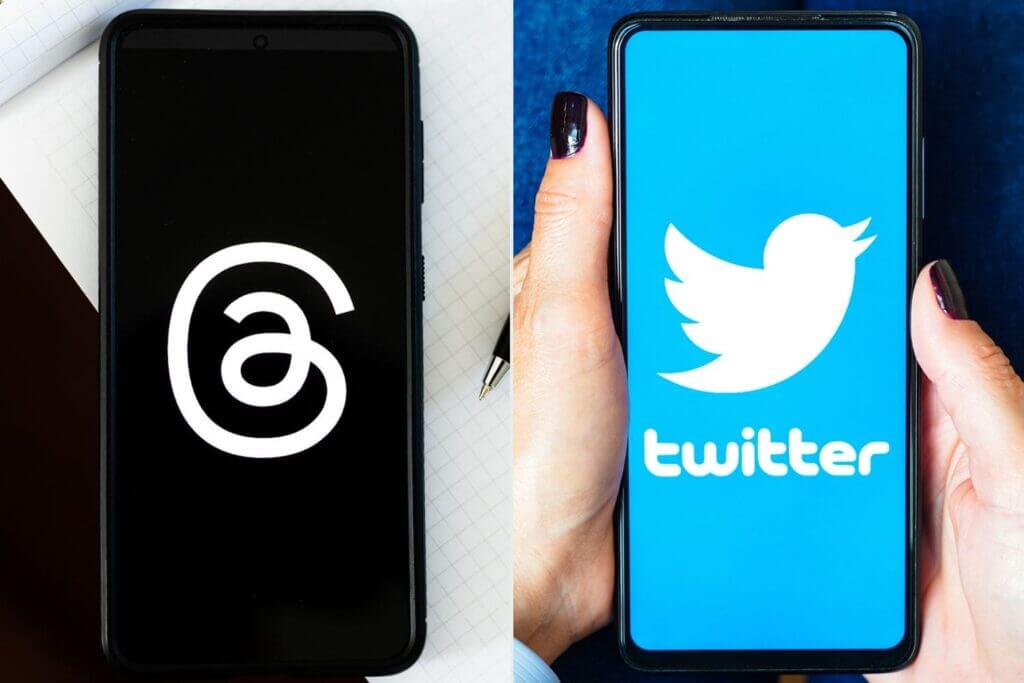Privacy and security in threads
Threads:
Threads is a messaging app developed by Meta (formerly Facebook) that aims to provide a focused and organized platform for private group conversations. Privacy and security in threads is very important to their users. It offers a threaded conversation format where users can engage in discussions within specific topics or threads, making it easier to follow conversations and maintain context.

Threads is designed to prioritize privacy and control for users. It allows individuals to create groups and invite specific people to join those groups, ensuring that conversations remain private and exclusive to the intended participants. Users can also adjust privacy settings to control who can see their content and manage their notification preferences.
Overall, Threads by Meta offers a streamlined and private messaging experience, emphasizing focused group conversations, seamless content sharing, and granular privacy controls.
Privacy and security in threads:
Privacy and security is more important to their users.
User privacy:
User privacy is a significant aspect of Threads, and Meta has implemented several measures to prioritize user privacy within the app. Here are some key elements highlighting the privacy features in Threads:
⦁ Private Group Conversations:
Threads is designed for private group conversations, allowing users to create specific groups and invite selected individuals to join. This ensures that conversations remain restricted to the intended participants and maintain a higher level of privacy compared to public platforms.
⦁ Granular Privacy Controls:
Threads provides users with granular privacy controls, empowering them to manage their visibility and control who can see their content. Users can choose to share updates and photos with specific groups or individuals, giving them control over the audience for their posts.
⦁ End-to-End Encryption:
Threads employs end-to-end encryption for messages sent within the app. This means that only the intended recipients can access and decipher the content of the messages, ensuring that conversations remain private and secure.
⦁ Location Sharing Control:
While Threads offers automatic status updates based on location, activity, and battery life, users have control over when and with whom they share their location. They can customize location sharing preferences and choose to share their location with specific groups or individuals, or completely opt out of location sharing.
⦁ Transparent Privacy Settings:
Threads provides clear and accessible privacy settings, making it easier for users to understand and manage their privacy preferences. Users can review and modify their privacy settings, including who can see their content and manage notification preferences, ensuring that they have control over their privacy on the platform.
⦁ Data Handling Practices:
Meta, the company behind Threads, follows privacy-focused data handling practices. They have implemented measures to safeguard user data and adhere to privacy regulations and standards, aiming to protect user information and maintain user trust.
It’s important to note that while Threads offers privacy features, users should still be cautious about the information they share and the privacy settings they choose. It’s advisable to review and adjust privacy settings regularly to align with individual preferences and comfort levels regarding privacy.
Security measures:
Threads incorporates various security measures to protect user information and ensure a secure messaging experience. Privacy and security of threads is very important to their users. Here are some key security measures implemented in Threads:
⦁ Secure Communication:
Threads utilizes end-to-end encryption for messages exchanged within the app. This means that the content of conversations is encrypted and can only be decrypted by the intended recipients, providing a high level of security and confidentiality.
⦁ Account Security:
Threads prioritizes account security by implementing measures such as strong password requirements and encouraging the use of two-factor authentication (2FA). Two-factor authentication adds an extra layer of security by requiring users to provide an additional verification code or use a biometric factor, such as fingerprint or face recognition, to access their accounts.
⦁ Data Protection:
Meta, the company behind Threads, employs robust data protection practices to safeguard user information. This includes implementing industry-standard security protocols, encryption methods, and access controls to protect user data from unauthorized access or breaches.
⦁ Privacy Controls:
Privacy controls in Threads not only offer users the ability to manage who can see their content but also contribute to security. By allowing users to choose their audience and control the visibility of their posts, Threads reduces the risk of sensitive information falling into the wrong hands.
⦁ Incident Response:
In the event of a security incident or potential breach, Meta maintains an incident response procedure. This includes promptly addressing and mitigating security issues, investigating the cause, and taking necessary steps to enhance security measures to prevent similar incidents in the future.
⦁ User Reporting and Moderation:
Threads incorporates reporting and moderation features to address inappropriate or harmful content. Users can report offensive or abusive behavior, and the Threads team reviews and takes appropriate action against violations of community guidelines, ensuring a safer environment for users.
It’s important to note that while Threads implements security measures, no system is completely immune to vulnerabilities. Users should also practice good security habits, such as using strong and unique passwords, keeping their devices and apps up to date, and being cautious about clicking on suspicious links or sharing sensitive information.
Privacy settings:
Threads offers users a range of privacy settings that allow them to control the visibility of their content and manage their overall privacy on the platform. Privacy and security of threads is very important to their users. Here are some key privacy settings available in Threads:
⦁ Audience Selection:
When creating a post or sharing content, users can choose the specific audience with whom they want to share. They can select individual friends, specific groups, or create custom lists of people they want to share the content with. This ensures that content is only visible to the intended recipients.
⦁ Close Friends List:
Threads provides a Close Friends list feature where users can curate a group of trusted friends. When sharing content, users can easily select the Close Friends list as the audience, ensuring that the content is restricted to a select group of individuals.
⦁ Automatic Friends Lists:
Threads automatically generates friends lists based on interactions and engagement patterns, such as “Besties” or “Frequent Chats.” These lists can be used to conveniently share content with groups of friends based on predefined criteria.
⦁ Privacy Controls:
Users have access to privacy controls that allow them to manage who can see their content. They can adjust settings to control who can view their status updates, shared photos, and other content. Additionally, users can manage who can send them direct messages, providing further control over their messaging privacy.
⦁ Notifications Customization:
Threads enables users to customize their notification preferences, including the type and frequency of notifications they receive. Users can choose to receive notifications for specific groups or individuals, helping them manage their privacy and control their level of engagement on the platform.
⦁ Location Sharing Preferences:
While Threads offers automatic status updates based on location, users have control over when and with whom they share their location. They can customize location sharing preferences to share their whereabouts only with specific groups or individuals or completely opt out of location sharing.
Users should regularly review and adjust their privacy settings in Threads to align with their preferences and comfort levels regarding privacy. It’s important to be mindful of the audience selected when sharing content and to consider the potential implications of sharing personal information on any social media platform.
Privacy controls:
Threads provides users with a range of privacy controls to manage their visibility, control who can see their content, and customize their privacy settings. Privacy and security in threads is very important to their users. Here are some key privacy controls available in Threads:
⦁ Content Visibility:
When creating a post or sharing content, users can choose the specific audience they want to share it with. They can select individual friends, specific groups, or create custom lists of people they want to share the content with. This allows users to control who can see their posts and restrict visibility to desired recipients.
⦁ Close Friends List:
Threads includes a Close Friends list feature where users can curate a group of trusted friends. They can add specific individuals to this list, and when sharing content, users have the option to limit visibility to the Close Friends list only. This ensures that content is exclusively shared with a select group of close connections.
⦁ Automatic Friends Lists:
Threads automatically generates friends lists based on interactions and engagement patterns, such as “Besties” or “Frequent Chats.” Users can leverage these lists to conveniently share content with specific groups of friends based on predefined criteria.
⦁ Story Controls:
Threads allows users to control who can view their Instagram Stories. They can choose to share their Stories with all their Instagram followers or limit visibility to a selected group of Close Friends. This gives users control over who can see their ephemeral content.
⦁ Direct Messages:
Users can manage their messaging privacy by controlling who can send them direct messages. They can adjust settings to allow messages from everyone, only their friends, or limit it to specific groups or individuals. This helps in managing privacy and reducing unwanted or unsolicited messages.
⦁ Notifications Management:
Threads provides options for customizing notification preferences. Users can choose the type and frequency of notifications they receive, such as message notifications or activity alerts. By customizing notifications, users can manage their privacy and control the level of engagement they have with the app.
It’s essential for users to regularly review and adjust their privacy settings in Threads to align with their preferences and comfort levels. Being mindful of the audience selected when sharing content and understanding the implications of sharing personal information is crucial for maintaining privacy on any social media platform.
Account security:
Account security is a significant aspect of Threads, and Meta (formerly Facebook) has implemented various measures to ensure the protection of user accounts. Privacy and security of threads is very important to their users. Here are some key elements highlighting account security in Threads:
⦁ Secure Login:
Threads encourages users to set strong and unique passwords for their accounts. A strong password is a crucial line of defense against unauthorized access. Additionally, Threads supports the use of two-factor authentication (2FA) for added security. Enabling 2FA requires users to provide an additional verification code or use a biometric factor, such as fingerprint or face recognition, to access their accounts.
⦁ Account Recovery:
In the event that a user forgets their password or is locked out of their account, Threads provides account recovery options. Users can follow a secure account recovery process to regain access to their accounts while ensuring that only authorized individuals can regain control.
⦁ Suspicious Activity Detection:
Threads employs automated systems that monitor user accounts for any suspicious activity. Unusual login attempts or account behaviors can trigger security measures, such as notifying the account owner or requiring additional verification steps to verify the account’s authenticity.
⦁ Secure Data Handling:
Meta, the company behind Threads, follows industry-standard security practices to protect user data. This includes employing encryption protocols and access controls to safeguard user information from unauthorized access or breaches. Meta has dedicated security teams and processes in place to ensure the security of user accounts and data.
⦁ Security Notifications:
Threads notifies users about security-related events and activities related to their accounts. This includes notifying users about successful logins from new devices or locations, password changes, or any other suspicious account activity. These notifications help users stay informed and promptly identify any unauthorized access attempts.
⦁ Responsible Vulnerability Disclosure:
Meta has a responsible disclosure policy, encouraging users and security researchers to report any potential security vulnerabilities they discover in Threads. By following responsible disclosure practices, Meta can promptly address and mitigate any identified vulnerabilities to enhance the overall security of the platform.
It’s important for users to take an active role in account security by using strong and unique passwords, enabling two-factor authentication, and being cautious about phishing attempts or suspicious account activities. Regularly reviewing account security settings and promptly reporting any unauthorized access attempts or suspicious activities can help ensure the security and integrity of user accounts in Threads.
Information security:
Information security is a crucial aspect of Threads, and Meta (formerly Facebook) implements various measures to ensure the protection and security of user information. Privacy and security of threads is very important to their users. Here are some key elements related to information security in Threads:
⦁ Encryption:
Threads employs end-to-end encryption for messages sent within the app. This means that the content of conversations is encrypted on the sender’s device and can only be decrypted by the intended recipients. It ensures that messages remain private and inaccessible to unauthorized parties.
⦁ Secure Data Handling:
Meta follows industry-standard security practices to protect user data. This includes implementing encryption protocols, access controls, and secure data storage mechanisms. These measures aim to safeguard user information from unauthorized access, breaches, or data leaks.
⦁ Access Controls:
Threads incorporates access controls to limit who can view and interact with user information. Users have control over their privacy settings, allowing them to choose the audience for their posts and control who can send them direct messages. These controls help users manage their information and restrict access to desired recipients.
⦁ Account Security:
Threads promotes account security by encouraging users to set strong and unique passwords for their accounts. Additionally, the app supports two-factor authentication (2FA) to provide an extra layer of protection. Enabling 2FA requires users to provide an additional verification code or use a biometric factor, such as fingerprint or face recognition, to access their accounts. privacy and security of threads is very important to their users. therefore users are setting more strong and unique password in their account.
⦁ Security Monitoring:
Threads incorporates automated systems that monitor user accounts and activities for any suspicious behavior or unauthorized access attempts. These systems help identify and respond to potential security threats promptly.
⦁ Security Monitoring:
In the event of a security incident or data breach, Meta has incident response procedures in place. These procedures involve promptly addressing and mitigating security issues, investigating the cause of the incident, and taking necessary steps to enhance security measures and prevent similar incidents in the future.
It’s important to note that while Threads and Meta strive to implement robust information security measures, no system is entirely immune to vulnerabilities. Users should also take proactive steps to protect their own information, such as using strong and unique passwords, enabling security features like 2FA, and being cautious about sharing sensitive information or clicking on suspicious links.
For the most accurate and up-to-date information on information security in Threads, refer to the official documentation or privacy policy provided by Meta.
Privacy-preserving features:
Threads incorporates several privacy-preserving features to enhance user privacy and protect personal information. Here are some privacy-preserving features in Threads:
⦁ Selective Sharing:
Users can choose specific audiences or groups to share their content with. Whether it’s photos, videos, or status updates, users have control over who can see their posts. This ensures that content is only visible to the intended recipients and helps maintain privacy.
⦁ Close Friends List:
Threads offers a Close Friends list feature where users can curate a group of trusted friends. When sharing content, users have the option to limit visibility to this selected group. It allows users to share more personal or sensitive content with a smaller, trusted circle.
⦁ Customizable Privacy Settings:
Threads provides users with a range of customizable privacy settings. Users can adjust their privacy preferences, control who can view their updates, and manage notification settings. These privacy settings empower users to customize their privacy levels according to their preferences.
⦁ Location Sharing Control:
While Threads offers automatic status updates based on location, users have control over when and with whom they share their location. Users can customize location sharing preferences, choosing to share their whereabouts only with specific groups or individuals or completely opt out of location sharing.
⦁ End-to-End Encryption:
Threads employs end-to-end encryption for messages exchanged within the app. This means that conversations are encrypted and can only be decrypted by the intended recipients. It adds an extra layer of privacy and ensures that messages remain confidential and secure.
⦁ Anonymous Interaction:
Threads provides the option for users to interact anonymously within certain features. This allows users to participate in discussions or engage with content without revealing their identity, providing an additional level of privacy for users who prefer to remain anonymous.
These privacy-preserving features in Threads prioritize user privacy and offer users greater control over their personal information and content. Users can tailor their sharing preferences, limit visibility, and engage in conversations while maintaining their desired privacy levels.
User data security:
User data security is a top priority in Threads, and Meta (formerly Facebook) implements various measures to ensure the protection and security of user data. Here are some key aspects related to user data security in Threads:
⦁ Encryption:
Threads employs end-to-end encryption for messages sent within the app. This means that the content of conversations is encrypted on the sender’s device and can only be decrypted by the intended recipients. It ensures that messages remain private and inaccessible to unauthorized parties, including Meta.
⦁ Secure Data Handling:
Meta follows industry-standard security practices to protect user data. This includes implementing encryption protocols, access controls, and secure data storage mechanisms. These measures aim to safeguard user information from unauthorized access, breaches, or data leaks.
⦁ Limited Data Collection:
Threads collects only the necessary user data to provide its services and enhance the user experience. Meta has a data minimization approach, ensuring that data collection is limited to what is essential for the functioning of the app.
⦁ User Consent:
Meta obtains user consent for collecting and processing their data, adhering to applicable privacy laws and regulations. Users have control over their data and can choose to provide or withhold consent for specific data processing activities.
⦁ Transparent Data Practices:
Meta provides transparency regarding data practices in Threads. This includes clearly communicating what data is collected, how it is used, and who it may be shared with. Users can review the privacy policy and terms of service to understand how their data is handled.
⦁ Strong Access Controls:
Meta employs stringent access controls to protect user data from unauthorized access. This includes implementing authentication mechanisms, role-based access controls, and monitoring systems to ensure that only authorized personnel can access sensitive user data.
⦁ Incident Response and Breach Mitigation:
Meta has incident response procedures in place to handle security incidents or data breaches effectively. In the event of a breach, Meta takes immediate steps to mitigate the impact, investigate the incident, and notify affected users as required by applicable laws and regulations.
It’s important for users to also take proactive steps to protect their own data by using strong and unique passwords, enabling security features like two-factor authentication, and being cautious about sharing sensitive information.
For the most accurate and up-to-date information on user data security in Threads, refer to the official documentation or privacy policy provided by Meta.
Privacy-enhancing technologies:
Threads incorporates various privacy-enhancing technologies to prioritize user privacy and provide a secure messaging experience. Here are some privacy-enhancing technologies in Threads:
⦁ End-to-End Encryption:
Threads utilizes end-to-end encryption for messages exchanged within the app. This ensures that only the intended recipients can decrypt and access the content of the messages. End-to-end encryption adds a strong layer of privacy and security, preventing unauthorized access to message content.
⦁ Anonymous Interaction:
Threads allows users to engage in discussions or interact with content anonymously within certain features. This feature enables users to participate in conversations or engage with posts without revealing their identity, providing an additional level of privacy and discretion.
⦁ Privacy Settings:
Threads offers robust privacy settings that allow users to control the visibility of their content. Users can choose specific audiences or groups with whom they want to share their posts, ensuring that content remains restricted to the desired recipients. Users have control over their privacy settings, empowering them to manage their privacy preferences.
⦁ Location Sharing Control:
Users have control over when and with whom they share their location within Threads. They can customize their location sharing preferences, choosing to share their whereabouts only with specific groups or individuals or completely opting out of location sharing. This feature enhances privacy by giving users control over their location information.
⦁ Access Controls:
Threads incorporates access controls to limit who can view and interact with user information. Users have control over their privacy settings, allowing them to choose the audience for their posts and control who can send them direct messages. These access controls help users manage their information and restrict access to desired recipients.
⦁ Data Minimization:
Threads follows a data minimization approach, collecting and retaining only the necessary user data required for the app’s functioning. By minimizing the data collected, Threads aims to reduce the exposure of user information and enhance privacy.
These privacy-enhancing technologies in Threads are designed to provide users with greater control over their personal information, limit exposure to unwanted audiences, and enhance overall privacy and security within the app.
Privacy regulation compliance:
Meta, the company behind Threads, is committed to complying with applicable privacy regulations and standards to protect user privacy. While I don’t have access to the specific privacy policy or compliance details of Threads, here are some general aspects related to privacy regulation compliance that Meta strives to adhere to:
⦁ General Data Protection Regulation (GDPR):
Meta aims to comply with the GDPR, which sets forth privacy and data protection requirements for individuals in the European Union (EU). This includes obtaining appropriate user consent, providing transparency about data processing practices, and enabling user rights regarding their personal data.
⦁ California Consumer Privacy Act (CCPA):
Meta aims to comply with the CCPA, a privacy law that grants California residents certain rights regarding their personal information. This includes providing notice about data collection and sharing practices, offering opt-out options, and honoring user rights to access and delete their data.
⦁ Other Privacy Laws and Regulations:
Meta strives to comply with other applicable privacy laws and regulations worldwide. These may include data protection laws specific to certain countries or regions, such as the Personal Information Protection and Electronic Documents Act (PIPEDA) in Canada or the Australian Privacy Act.
⦁ Privacy Policy Transparency:
Meta provides a privacy policy that outlines how user data is collected, used, and shared within Threads. The privacy policy typically includes information about data handling practices, user rights, and contact information for privacy inquiries.
⦁ User Rights and Control:
Meta aims to provide users with control over their personal data and privacy settings. This may include options for accessing, modifying, or deleting personal information, as well as managing preferences related to data sharing and communications.
It’s important to review the official privacy policy and terms of service provided by Meta or Threads for the most accurate and up-to-date information regarding privacy regulation compliance. These documents should provide specific details on how Meta ensures compliance with privacy regulations and how user privacy rights are protected within Threads.
secure messaging:
Threads by Meta (formerly Facebook) prioritizes security and includes measures to provide a secure messaging experience. Here are some elements related to secure messaging in Threads:
⦁ End-to-End Encryption:
Threads incorporates end-to-end encryption for messages exchanged within the app. This means that the content of conversations is encrypted on the sender’s device and can only be decrypted by the intended recipients. End-to-end encryption adds a strong layer of privacy and security, ensuring that messages remain confidential and inaccessible to unauthorized parties.
⦁ Message Security:
The messages sent and received in Threads are protected by encryption while in transit. This helps safeguard the content of conversations from interception or unauthorized access. The use of encryption ensures that the messages remain secure and private throughout the communication process.
⦁ Secure Data Handling:
Threads follows industry-standard security practices to protect user data, including messages. This includes implementing encryption protocols, access controls, and secure data storage mechanisms. These measures aim to safeguard user information from unauthorized access, breaches, or data leaks.
⦁ User Authentication:
Threads employs user authentication mechanisms to ensure that only authorized individuals can access and use the app. This helps prevent unauthorized access to user accounts and protects the confidentiality of messages.
⦁ Security Monitoring:
Threads incorporates automated systems that monitor user accounts and activities for any suspicious behavior or unauthorized access attempts. These systems help identify and respond to potential security threats promptly.
While Threads incorporates these security features, it’s important for users to also practice good security habits, such as using strong and unique passwords, enabling two-factor authentication, and being cautious about sharing sensitive information. Users should also keep their devices and apps updated with the latest security patches to ensure overall security while using Threads for messaging.
Differences between threads and twitter privacy & security:

Threads and Twitter are distinct platforms with different features, functionalities, and approaches to privacy and security. Here are some key differences between Threads and Twitter regarding privacy and security:
⦁ Messaging vs. Public Broadcasting:
Threads focuses on private group conversations and messaging, whereas Twitter primarily revolves around public broadcasting and sharing content with a wider audience. As a messaging app, Threads inherently offers more privacy controls and encryption for private conversations, while Twitter’s primary focus is on public interactions.
⦁ End-to-End Encryption:
Threads employs end-to-end encryption for messages, ensuring that the content of conversations remains encrypted and accessible only to the intended recipients. On the other hand, Twitter does not provide end-to-end encryption for public tweets, as they are designed for public consumption and can be viewed by anyone on the platform.
⦁ Audience Control:
In Threads, users have granular control over the audience with whom they share their content. They can choose specific groups or individuals to share their posts with, offering more control over the visibility of their content. Twitter, on the other hand, is primarily focused on broadcasting to a wide audience, although users can adjust their account settings to control who can see their tweets.
⦁ Profile Visibility:
Threads is designed for more intimate and private conversations, allowing users to have more control over their profile visibility and who can view their updates. Twitter, being a public platform, focuses on maximizing profile visibility to reach a wider audience and encourages users to build a public presence.
⦁ User Authentication:
Both Threads and Twitter utilize user authentication mechanisms to secure user accounts. However, the extent of authentication required may differ. Threads may have stricter authentication requirements due to its private messaging nature, while Twitter may have more relaxed authentication for public tweeting.
⦁ Privacy Policies and Practices:
Threads and Twitter have their own privacy policies and practices that outline how user data is collected, used, and shared. It’s important to review each platform’s specific privacy policies to understand their approach to privacy and security.
It’s worth noting that while both platforms aim to provide privacy and security, the level and nature of privacy and security features may vary due to their different purposes and user experiences. Users should be mindful of the intended use and audience of each platform when considering privacy and security aspects.
Who is provide more privacy and security threads or twitter:
In terms of privacy and security, Threads and Twitter have different focuses and features, leading to variations in the level and nature of privacy and security they provide. Here’s a general comparison:

Privacy:
⦁ Threads: Threads places a strong emphasis on privacy, offering features such as end-to-end encryption for messages, audience selection for content sharing, and customizable privacy settings. It is designed for private group conversations, allowing users to have more control over the visibility of their content and who can access their updates.
⦁ Twitter: Twitter is primarily a public platform, focusing on public broadcasting and sharing content with a wider audience. While Twitter does provide privacy controls, such as the ability to make tweets private and limit the visibility of your profile, the default nature of the platform is more public-oriented. Twitter encourages users to build a public presence and engage with a large audience.
Security:
⦁ Threads: Threads incorporates security measures like end-to-end encryption for messages and secure data handling practices. It employs user authentication mechanisms to protect user accounts and employs security monitoring to identify and respond to potential threats. Meta (formerly Facebook), the company behind Threads, follows industry-standard security practices to safeguard user data.
⦁ Twitter: Twitter also takes security seriously and implements measures such as user authentication and security monitoring to protect user accounts. However, as a more public platform, the emphasis on security is often more focused on account security, preventing unauthorized access, and mitigating risks related to public interactions rather than private messaging.
It’s important to note that both Threads and Twitter continually work to enhance privacy and security measures based on user feedback and evolving best practices. The level of privacy and security experienced on each platform also depends on individual user behavior and choices, such as the information shared and the settings configured.
To make an informed decision about which platform provides more privacy and security for your specific needs, it’s recommended to review the official privacy policies and terms of service provided by Threads and Twitter, and assess how well they align with your privacy and security preferences.
Is threads app safe:

As of my knowledge cutoff in September 2021, there is an app called “Threads” developed by Facebook for sharing photos, videos, and messages with close friends on Instagram. While I don’t have information on the app’s specific safety measures after that date, it’s generally important to consider several factors when determining the safety of any app:
⦁ Reputation and Trust:
Consider the reputation and trustworthiness of the developer. Facebook, being a well-known company, generally invests in security measures to protect user data.
⦁ Privacy Settings:
Check the privacy settings within the app to understand how your data is being collected, stored, and shared. Review the permissions it requests and ensure they align with your comfort level.
⦁ User Reviews and Ratings:
Look for user reviews and ratings on trusted platforms such as app stores to get an idea of other users’ experiences and any potential issues they have encountered.
⦁ App Updates:
Regular updates indicate that the developers are actively addressing security vulnerabilities and improving the app’s overall safety.
⦁ Personal Information Protection:
Understand what personal information the app collects and how it is used. Be cautious while sharing sensitive information and adjust your privacy settings accordingly.
Threads privacy concern:
Threads, developed by Facebook, has raised privacy concerns in the past. Here are a few points to consider:
⦁ Data Collection: Like any app, Threads collects certain data from its users. This includes information such as your device details, location, contacts, and usage patterns. Facebook has a history of collecting user data for targeted advertising and personalization purposes.
⦁ Integration with Instagram: Threads is closely integrated with Instagram, and it requires access to your Instagram account to function properly. This means that the data collected by Threads is likely shared with Facebook and its affiliated companies.
⦁ Auto Status Feature: Threads includes an auto status feature that shares your location, battery level, and other details automatically with your close friends on Instagram. While this feature is optional and can be disabled, it does raise concerns about privacy and control over your personal information.
⦁ Targeted Advertising: Facebook is known for its targeted advertising practices, and data collected through Threads may be used to serve personalized ads both within the app and on other Facebook platforms.
It’s important to carefully review the app’s privacy policy, terms of service, and permissions requested during installation to understand how your data is being used and shared. Additionally, keeping your app and device software up to date can help protect against potential security vulnerabilities.
Threads security concern:
Threads, developed by Facebook, has faced security concerns in the past. Here are some points to consider:
⦁ Privacy Settings: While Threads offers privacy settings, it’s crucial to review and understand these settings to ensure you have control over the information you share. Adjusting your privacy settings appropriately can help mitigate potential security risks.
⦁ Data Breaches: Like any online service, there is always a risk of data breaches. If a data breach occurs, sensitive user information could be exposed. It’s important to stay informed about any security incidents related to Threads and take necessary precautions, such as changing passwords and enabling two-factor authentication.
⦁ Encryption: Threads uses end-to-end encryption for its messages, which helps protect the content of your conversations from unauthorized access. However, it’s essential to note that end-to-end encryption does not guarantee absolute security, as vulnerabilities can exist in other areas of the app or device.
⦁ Third-Party Access: Threads may require access to various permissions on your device, such as camera, microphone, contacts, and location. Granting these permissions could potentially expose your personal data to third parties if the app’s security measures are compromised or if data is mishandled.
⦁ Account Security: Ensure you have a strong, unique password for your Threads account and enable two-factor authentication if available. This can help protect your account from unauthorized access.
To stay informed about the latest security updates and concerns related to Threads, it’s advisable to regularly check for app updates, review user feedback and ratings, and monitor news and security advisories from reliable sources.



